Keir Leslie – 26 November, 2014
In another room is Gemma Syme's video work 'Stunt double', playing on a flat screen TV placed on an easel. I am not quite sure if the easel, with its connotations of painterliness and work-in-progress, is entirely at ease with the video's self-sufficient sculptural logic. The video is quite simple: a frontal mid shot of a woman's hips and thighs, as she lowers various forms, predominantly vessels, into her plain underwear.
Christchurch
Imogen Taylor and Gemma Syme
Two in the Pink
1 November - 22 November 2014
North Projects is located in a former dwelling on Manchester Street, on the Bealey Avenue corner. It is the back half of a larger house that has been divided, at some point in the past, into multiple tenancies to maximise the rent, and like many such houses around Bealey and Fitzgerald Avenues, where the central city transitions into the inner suburbs, appears to have had a rough past. There is a great deal of deferred maintenance visible, and the earthquake has only worsened its situation, with a floor level that falls away to the east. A set of carefully considered and sympathetic interventions have been employed to position the building as an effective gallery space without erasing the character of the site. This rawness is a strength of the North Projects space, and one that has been effectively drawn out by the programming and installation to date.
This is the second show at North Projects, following on from Daegan Wells and Michael Lee’s Kissing the Wall. Two in the Pink shows work by Imogen Taylor and Gemma Syme. Syme presents a video and a performance, while Taylor shows a small group of her paintings.
It is, I think, the first time Taylor has shown in Christchurch since the former artist-run space ABC’s final show in 2012, and the first time she has shown paintings here. The paintings tend to the small in scale, and are clearly defined by an engagement with avant-garde European painting between 1910 and 1960. Many of her formal strategies derive from post-cubist painting, particularly Orphism and Fernand Leger’s mechanist paintings, while her material choices, of hessian, aluminium mesh and other rough materials recall 1950s art informel as practiced by Antoni Tàpies and Alberto Burri. There is a definite European flavour to her paintings, in their self-awareness and self-conscious situation within an art historical context.
They are not all “pleasant” paintings, and some are arguably not “good” paintings. Not all of them succeed in achieving formal coherence and self-confidence. John Hurrell, in his review [http://eyecontactsite.com/2012/02/uneven-taylor] of a show of Taylor’s work at Michael Lett, suggests that that show was let down by a variability in quality. Yet Taylor’s practice revolves around consideration of the meaning of “success” and “failure”, or “good” and “bad”, in modernist painting practice. Her works are part of a larger argument about the nature and history of the medium, especially when looked at as a suite of works. This decision - to make a simple analysis of her practice by resort to the critical stand-bys of success or failure as formal painting impossible - is quite conscious. One effect is that it forces the viewer to engage in other ways and along other axes, beyond a simple formal analysis.
In Taylor’s case, one other way into her work centres around the body and sexuality. The choice of supports here, from sharp edged aluminium mesh to the soft intimacy of a bedsheet, suggest directly physical experiences, readings that carry over into the organic forms and suggestive titles of her paintings. This show offers an example of a contemporary painting practice deeply engaged with the medium of painting while still dealing with concerns around gender and sexuality in a sophisticated and rewarding way.
In another room is Gemma Syme’s video work Stunt double, playing on a flat screen TV placed on an easel. I am not quite sure if the easel, with its connotations of painterliness and work-in-progress, is entirely at ease with the video’s self-sufficient sculptural logic. The video is quite simple: a frontal mid shot of a woman’s hips and thighs, as she lowers various forms, predominantly vessels, into her plain underwear. It is cropped in such a way that the waistline of her underwear coincides with the upper bound of the screen, a careful choice that maintains an obliqueness to the operation. The wry queering of the everyday trappings of gender, and use of quotidian objects is reminiscent of Grant Lingard’s mid-90s work using men’s underwear, in particular his Hutch and Lure (http://christchurchartgallery.org.nz/collection/objects/99-421-19/). Formally minimal, with is focus on the relationship of the hand and body to object, Stunt double offers a humorous but rigorous examination of a bounded set of interactions.
The insertion of bottles into underwear is clearly a phallic pun, and the video’s awkward and tentative nature suggests a parodying rather than a valorisation of the phallic signifier. It seems to be a lampooning of the Freudian myth of penis envy, with a title that puns both verbally on the word ‘cunt’ - perhaps operating as an homage to the 1980s London feminist theatre group Cunning Stunts or the later NZ collective of a similar name - while also offering a performative pun on the phallic function. By offering these shrouded vessels as an alternative, ludicrous substitute for the penis, Syme seems to suggest that by virtue of greater size or more insistent rigidity, they are a hyperreal stunt double, one more effective, more virile, than the original, offering the possibility of a sexual economy in which the penis has been superseded or displaced.
Both artists share a sense of bodily humour and vulnerability, and the pairing cleverly draws out and develops complexities within their practices. This is a strong early show from North, making a clear statement about the intent and approach of the new space.
Keir Leslie
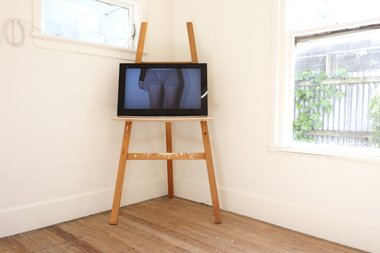
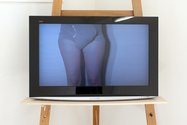
 Advertising in this column
Advertising in this column Two Rooms presents a program of residencies and projects
Two Rooms presents a program of residencies and projects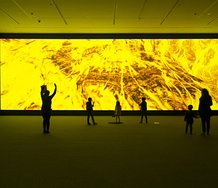
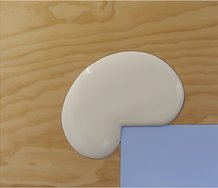
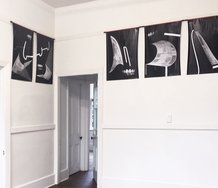
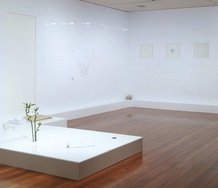
This Discussion has 0 comments.
Comment
Participate
Register to Participate.
Sign in
Sign in to an existing account.